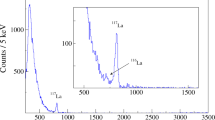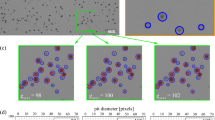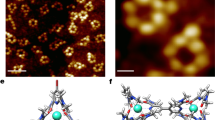Abstract
I. CURIE-JOLIOT, Anderson and Neddermeyer, Meitner and Philipp have been able to observe positive electrons produced by the hard γrays of thorium C″ in lead and other elements. An attempt to explain the phenomenon has been made by Oppenheimer and Plesset, who consider it as a kind of photo-effect from the levels of negative energy, the absorption of a quantum of light energy resulting in the formation of two material particles, a negative and a positive electron. A pair of these electrons, formed in the gas of a Wilson chamber, is to be seen on one of the photographs published by Curie-Joliot1.
This is a preview of subscription content, access via your institution
Access options
Subscribe to this journal
Receive 51 print issues and online access
$199.00 per year
only $3.90 per issue
Buy this article
- Purchase on Springer Link
- Instant access to full article PDF
Prices may be subject to local taxes which are calculated during checkout
Similar content being viewed by others
References
I. Curie and F. Joliot, J. Phys., 4, 429 ; 1933.
C. D. Ellis, Proc. Roy. Soc., A, 138, 318 ; 1932.
J. R. Oppenheimer and M. S. Plesset, Phys. Rev., 44, 53 ; 1933.
W. H. Furry and J. F.Carlson, Phys. Rev., 44, 237 ; 1933.
Author information
Authors and Affiliations
Rights and permissions
About this article
Cite this article
SKOBELTZYN, D. Positive Electron Tracks. Nature 133, 23–24 (1934). https://doi.org/10.1038/133023a0
Issue Date:
DOI: https://doi.org/10.1038/133023a0
This article is cited by
-
Production of Positive Electrons by Β-Particles
Nature (1934)
Comments
By submitting a comment you agree to abide by our Terms and Community Guidelines. If you find something abusive or that does not comply with our terms or guidelines please flag it as inappropriate.



